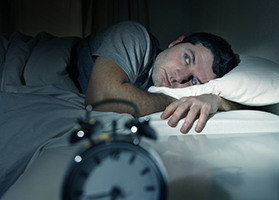 Type 2 diabetes is becoming increasingly common. So, unsurprisingly, are many of the factors that cause it.
Type 2 diabetes is becoming increasingly common. So, unsurprisingly, are many of the factors that cause it.
One of the best established of these causes is not something you would expect can contribute to type 2 diabetes.
It has nothing to do with unhealthy food, lack of exercise, obesity, or heart health. It is something that occurs almost exclusively at night.
Numerous reports published in academic journals prove that insomnia interferes with glucose metabolism and can even cause type 2 diabetes.
The first studies that found that sleep deprivation led to an increase in blood glucose levels were published in the 1960s and 1970s. They were criticized for restricting the subjects’ sleep to only four hours, which is less than most insomniacs sleep. Moreover, many experts disputed that such studies in an artificial laboratory setting can be generalized to the real world, but their conclusions that such sleep deprivation reduced glucose sensitivity by as much as 40 percent made a valuable contribution to the subject.
A 2007 report in the journal Sleep took results from the first National Health and Nutrition Examination Survey between 1982 and 1992 and calculated that people who slept five hours or less were more likely to develop type 2 diabetes than normal sleepers were.
This study was scientifically quite advanced, as it had the medical details of over 9,000 subjects and could therefore rule out obesity, physical activity levels, alcohol use, depression, and a whole range of other factors that could have caused the diabetes. After ruling out all other factors, they concluded that it was definitely the insomnia that caused it.
Similar studies with equally good scientific controls have been conducted on:
– 2,649 Japanese men for eight years (published in Diabetes Care in 2004),
– 6,599 nondiabetic Swedish men for approximately fifteen years (published in Diabetes Care in 2005)
– 4,140 and 4,129 non-diabetic German men and women (published in Diabetologia in 2005)
– and many more…
Therefore, the thesis that insomnia causes type 2 diabetes seems quite well established. If you sleep five hours or less on average, you have a larger risk of losing control over your blood glucose and developing type 2 diabetes.
But why does this happen?
Your night’s sleep can be divided into five stages: sleep stages one and two are light sleep, stages three and four are deep sleep, and stage five is REM sleep during which you dream. You get most of your important restorative sleep during the deep sleep of stages three and four.
Glucose metabolism is slower during deep sleep because your brain needs and uses very little energy. This is the sleep that insomniacs lack. Their bodies demand energy almost 24 hours a day, so their blood glucose must be maintained and their pancreases must continue to secrete insulin.
Remember that type 2 diabetes occurs when your blood glucose level and your insulin secretion are consistently so high that your body loses its sensitivity to insulin. If blood glucose and insulin secretion can never be dropped, as is the case with insomniacs, it is unsurprising that insulin insensitivity follows.
Other hormones responsible for increased blood glucose are also secreted in larger amounts if deep sleep is lacking, for example, growth hormone and cortisol.

 Overcoming IBD
Overcoming IBD Multiple Sclerosis
Multiple Sclerosis Banishing Bronchitis
Banishing Bronchitis Gum Disease Gone
Gum Disease Gone Overcoming Onychomycosis
Overcoming Onychomycosis Neuropathy No More
Neuropathy No More The Prostate Protocol
The Prostate Protocol Brain Booster
Brain Booster
 Ironbound
Ironbound
 Solution for Shingles
Solution for Shingles
 The Bone Density Solution
The Bone Density Solution
 The Ultimate Healing Protocol
The Ultimate Healing Protocol
 The Parkinson's Protocol
The Parkinson's Protocol
 The Chronic Kidney Disease Solution
The Chronic Kidney Disease Solution
 Overthrowing Anxiety
Overthrowing Anxiety The Fatty Liver Solution
The Fatty Liver Solution The Hypothyroidism Solution
The Hypothyroidism Solution
 The End of Gout
The End of Gout The Blood Pressure Program
The Blood Pressure Program
 The Oxigized Cholesterol Strategy
The Oxigized Cholesterol Strategy
 Stop Snoring And Sleep Apnea Program
Stop Snoring And Sleep Apnea Program
 The Arthritis Strategy
The Arthritis Strategy The Vertigo & Dizziness Program
The Vertigo & Dizziness Program The 3-Step Diabetes Strategy
The 3-Step Diabetes Strategy Hemorrhoids Healing Protocol
Hemorrhoids Healing Protocol The Erectile Dysfunction Master
The Erectile Dysfunction Master Weight Loss Breeze
Weight Loss Breeze The IBS Program
The IBS Program The Insomnia Program
The Insomnia Program The Migraine and Headache Program
The Migraine and Headache Program The Neck Pain Solution
The Neck Pain Solution The Menopause Solution
The Menopause Solution The Ejaculation Master
The Ejaculation Master The TMJ Solution
The TMJ Solution The Acid Reflux Solution
The Acid Reflux Solution The Fibromyalgia Solution
The Fibromyalgia Solution The Psoriasis Strategy
The Psoriasis Strategy